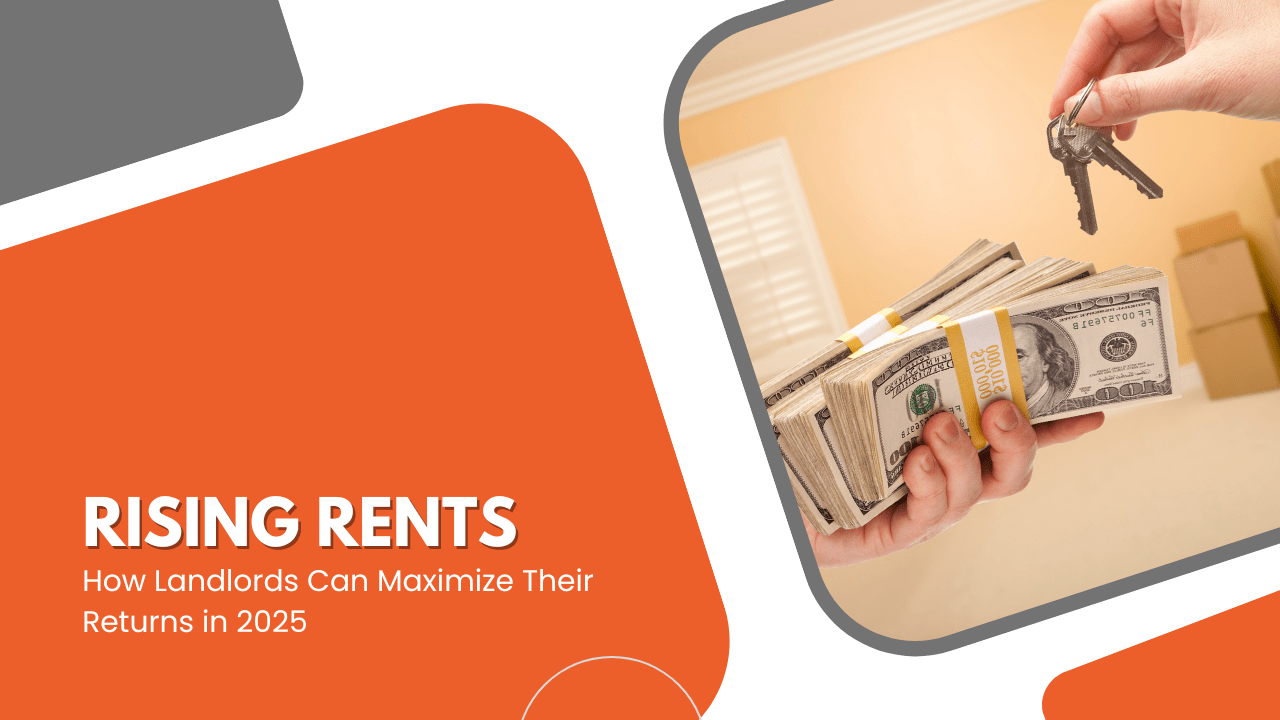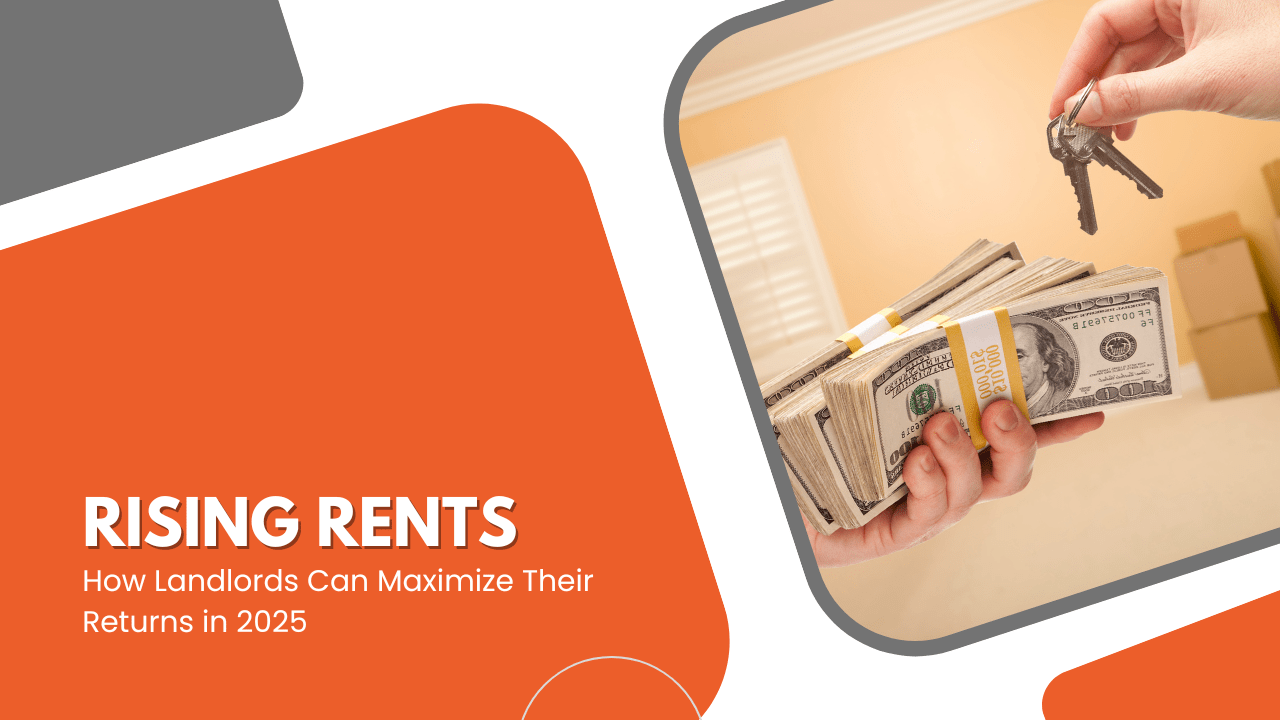
Have you noticed that rents are still rising in Georgia?
There’s a lot of interest in rental markets across the state, and that’s really good news.
Our Quick Overview:
|
This is a region that’s on the move, and if you’re investing here, or thinking about investing here, the opportunities are abundant.
As we move further into 2025, landlords across Georgia find they have some room for growth when it comes to rental values and long-term ROI. But maximizing returns in a rising rent environment isn’t just about increasing the price tag on your property. Tenants are feeling the squeeze of higher prices, and they’re going to expect some excellent value when their rent goes up. To really maximize earnings, property owners must invest in thoughtful upgrades and smart tenant management and be aware of shifting renter expectations.
As professional property managers, we have a deep understanding of what’s fueling Georgia’s rent increases, and we have some ideas of exactly how landlords can boost income, protect long-term value, and stay ahead of the competition in 2025.
Georgia Rental Market Outlook for 2025
As of early 2025, Georgia continues to see upward pressure on rental prices. Several key drivers are influencing this trend:
Population Growth. Georgia’s population is projected to surpass 11 million people in 2025. The state has become a magnet for people moving into the area from elsewhere, especially from more expensive areas like California, Illinois, and the Northeast.
Job Creation. All across Georgia, communities are experiencing job growth in industries such as logistics, manufacturing, tech, and film. New job hubs in places like Athens and Savannah are increasing rental demand beyond just Atlanta and its surrounding neighborhoods.
Limited Housing Supply. Like many states, Georgia is facing a housing shortage. Construction has picked up, but supply still lags behind the demand, especially for affordable single-family housing.
Lifestyle Shifts. More renters are seeking suburban homes with more space. With a growing population of renters working from home, extra space is especially good for increasing rents and ROI.
Rental prices across the state increased by more than the national average in 2024, with forecasts projecting a similar pace in 2025. Metro Atlanta has continued to see rising rents even while they stabilize in major cities elsewhere in the U.S.
Know Your Local Market and Price Strategically
Rents have to meet the market.
Before raising your rents or investing in upgrades, do your homework on what your submarket can support and what matters most to tenants.
Compare comps in your neighborhood, looking at similar properties by size, condition, and amenities. Don’t just rely on generic rent estimators. Get granular. Work with a property manager who can factor in neighborhood trends like school ratings, commute times, and proximity to retail or transportation.
Pay attention to seasonal pricing, too. Spring and summer bring higher rental demand, allowing you to list your property at a premium, especially if it’s well-located and in excellent condition. If your lease renews in winter, a smaller increase, or a longer lease, may help retain a good tenant.
Make Smart, ROI-Positive Upgrades
Rising rents will give you room and resources to invest in improvements, but don’t overdo it. The goal is to increase perceived value, not to necessarily turn a basic rental into a luxury home.
Affordable upgrades that yield a high return include:
Fresh paint and updated flooring
Modern fixtures and lighting
New cabinet hardware or faucets
Smart home features like keyless locks or thermostats
Curb appeal improvements (mulching, pressure washing, new mailbox or numbers)
If you’re in a highly competitive area or own multifamily units, consider upgrading shared amenities like laundry areas, parking, bike storage, or pet-friendly features.
Keep receipts and document improvements—you may be eligible for depreciation or tax deductions in the current or future tax years.
Focus on Tenant Retention to Reduce Turnover Costs
Owners earn more with higher rents, theoretically, but high turnover can quickly eat into any rental gains. Between lost rent, cleaning, repairs, and marketing, a vacant unit can cost a landlord thousands of dollars, depending on the market.
Tenant retention in 2025 should be a top priority. These are the strategies working best for us:
Renewal incentives. Sometimes, an upgraded appliance, a free carpet cleaning, or some fresh paint in a bedroom can induce tenants to renew their lease agreement.
Good communication. Tenants appreciate regular communication and quick responses to maintenance needs.
Direct instructions. We provide clear lease renewal timelines, so tenants aren’t caught off guard.
In growing markets, long-term tenants can be more valuable than a vacancy gamble. Retaining a reliable resident ensures steady cash flow with fewer stresses about the future of your rental.
Use Lease Renewals to Align with the Market
Rents have likely risen since your current tenants signed their lease. That’s why lease renewals are the perfect time to adjust rates gradually, rather than surprising tenants with a steep increase later.
A small and predictable increase is often easy to absorb if it’s accompanied by good service and a well-maintained property. Just be sure your lease includes proper notice terms (usually 30–60 days in Georgia) for rent increases.
You can also consider:
Offering tiered lease options, such as a lower rent for a 2-year lease or a slightly higher rate for month-to-month
Bundling services into rent, such as lawn care or pest control, to add perceived value
Offering flexible payment portals to make rent collection seamless
These things will not work for everyone. But, if they can seamlessly align with your investment goals and your income targets, give them some consideration.
Review and Reduce Operating Costs
One of the fastest ways to boost your rental property’s net income is to reduce expenses without sacrificing service. Rising rents give you some breathing room to analyze your operating costs and find efficiencies.
Consider refinancing your mortgage if interest rates drop later in 2025. You can also appeal your property taxes if assessed value jumped disproportionately. Shop around for insurance that’s more cost-effective and invest in preventative maintenance so those expensive emergency repairs are avoided.
Embrace Technology to Streamline Operations
Investing in property management technology can significantly maximize earnings and reduce costs for rental property owners by improving efficiency, minimizing errors, and automating time-consuming tasks. Owners today can benefit from online rent collection, automated lease renewals, and digital maintenance tracking, streamlining operations that often lead to costly delays or manual mistakes.
For example, missed or delayed rent payments are less common when tenants have access to online portals with automated reminders. Maintenance requests submitted through online platforms or mobile apps are easier to track and resolve quickly, preventing minor issues from becoming expensive repairs.
Technology also helps owners stay compliant with lease terms, legal requirements, and financial reporting. Automated documentation and accounting tools reduce the risk of late fees, tax penalties, or tenant disputes, which are issues that can cost landlords thousands. Vacancy periods are reduced through access to smart advertising platforms and applicant screening tools that help fill units faster with qualified tenants.
Additionally, investing in technology means more accurate budgeting and forecasting. Owners can use dashboards to monitor cash flow in real-time, plan capital improvements, and analyze performance across properties. These insights support better decision-making and long-term profitability.
For owners hesitant to spend money on new software, working with a professional property manager who already uses advanced technology is a smart alternative. We provide access to cutting-edge platforms without the upfront cost, giving owners the benefit of modern systems and expert oversight without the burden of managing them directly.
Expand Your Portfolio Wisely
If you’ve seen strong returns from one or two properties, you may be considering scaling up. Rising rents make it a great time to reinvest in Georgia’s market, and with rising prices, it’s more important than ever to be smart about what you buy and where.
When evaluating new investment opportunities, look for:
Undervalued markets on the rise.
Proximity to job centers, schools, or transportation
Strong rent-to-price ratios, ideally 0.8–1.0%
Low vacancy neighborhoods with growing populations
Properties with minor cosmetic needs, rather than structural or legal issues
Talk to a property manager before making offers. We can provide you with data that shows what a property is likely to earn, who is likely to rent from you, and what your ongoing expenses are likely to be.
Rising rents in Georgia are an encouraging sign of what’s to come for landlords in Georgia throughout the rest of 2025 and beyond. Maximizing your returns isn’t just about raising the rent. It’s about strategic decisions, proactive property management, and creating long-term value.
 Investors who treat their rentals like a business by monitoring income, managing expenses, and improving tenant satisfaction, are the owners best positioned to thrive in any market.
Investors who treat their rentals like a business by monitoring income, managing expenses, and improving tenant satisfaction, are the owners best positioned to thrive in any market.
Let’s talk about what’s possible for your property and your entire portfolio. When you’re ready to look at how to maximize your rents and your ROI, contact us at Property Services of Atlanta.

 Owner Portal
Owner Portal




